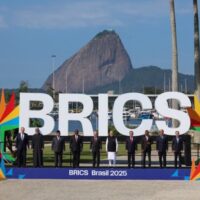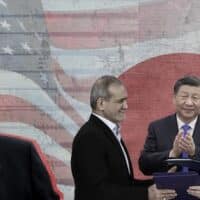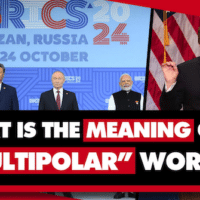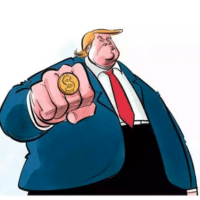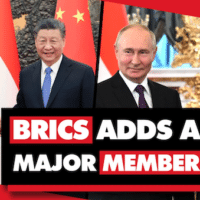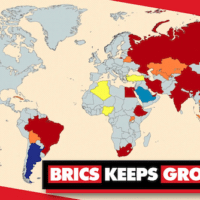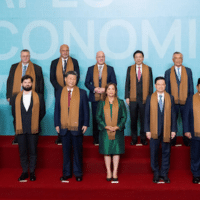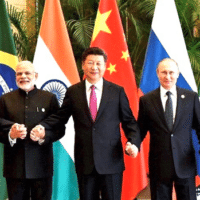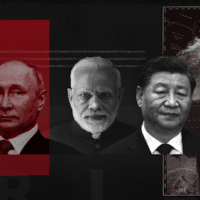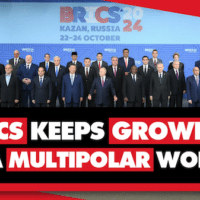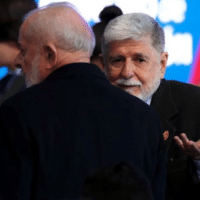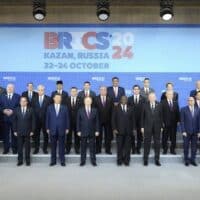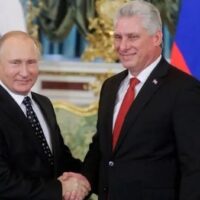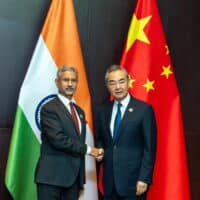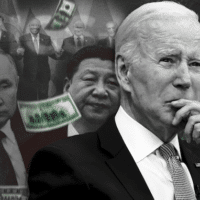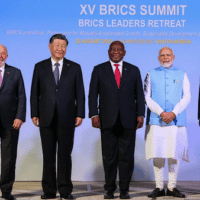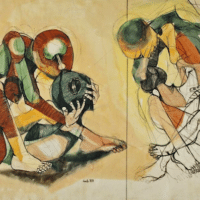-
What is BRICS and where is it going?
How internal divisions and geopolitical realities are shaping the bloc’s role in a rapidly transforming global order.
-
Russia–Iran–China: All for one, and one for all?
Although perhaps not yet obvious to Washington, a U.S. war on Iran will be viewed as one against Russia and China too. Both Putin and Xi know that Trump’s war is singularly directed at the transformational global ‘changes they are driving together.’
-
What is a ‘multipolar’ world? China says equality; Trump & Marco Rubio say imperial rivalry
What is the meaning of “multipolarity”? Donald Trump and Marco Rubio say “great power competition” with imperial spheres of influence. China and much of the Global South have an anti-imperialist view: “equality among all countries regardless of size”.
-
Trump’s tariffs to enrich the oligarchy
BRICS—initially founded by Brazil, Russia, India, China, and South Africa and now joined by Egypt, Ethiopia, Iran, Saudi Arabia, and the United Arab Emirates—is a coalition mainly of Global South countries. It is a counter to the G7 and NATO that offers an alternative to U.S. imperialist policies.
-
Economic response to U.S. imperialism
U.S. imperialism in short believes that it can do whatever it likes, that it is a law unto itself.
-
BRICS grows, adding Indonesia as member: World’s 4th most populous country, 7th biggest economy
BRICS keeps expanding. As a new full member, it added Indonesia, the 4th most populous country with the 7th largest economy on Earth. BRICS now has 10 members and 8 partners. They make up 41.4% of global GDP (PPP) and half the world population.
-
BRICS expands with 9 new partner countries. Now it’s half of world population, 41% of global economy
BRICS keeps expanding, adding 9 partner countries in January 2025, after admitting 4 new members in 2024. It now makes up roughly half of the global population and more than 41% of world GDP (PPP). It’s an economic powerhouse, with top producers of key commodities like oil, gas, grains, meat, and minerals.
-
A tale of two summits: U.S. influence on the decline as China and BRICS on the rise
The United States is continuing its economic battle against China in South America. However, its influence in the region is in decline as nations seek alternatives in order to forestall U.S. hegemony.
-
Trump threatens 100% tariff on BRICS nations in case of dollar replacement
‘Say goodbye to selling into the wonderful U.S. Economy’ if dollar replaced; President-elect Donald Trump warns BRICS.
-
The Kazan summit of BRICS
The BRICS declaration presumes that the international institutions in their current state are flawed because they are dominated by imperialist countries and are not representative enough; but they are flawed because their very essence is flawed, no matter how they are governed.
-
BRICS grows, adding 13 new ‘partner countries’ at historic summit in Kazan, Russia
BRICS held a summit in Kazan, Russia in October 2024, where it expanded with 13 “partner nations”, after adding four new members. These are the most important takeaways from the historic meeting.
-
Why Brazil opposes Venezuela’s BRICS membership
The 16th Summit of the BRICS organization is taking place this week in the Russian city of Kazan. President Nicolás Maduro was invited by the Russian president himself, Vladimir Putin, at the beginning of August, and is attending with a Venezuelan delegation.
-
BRICS countries call for a multipolar, equitable and democratic world order
In the Summit held in the Russian city of Kazan, BRICS members condemned the genocidal Israeli war on West Asia, the illegal sanctions regimes imposed on the people of the world by the U.S. and its allies, and Western dominated multilateral institutions.
-
Cuba requests entry into the BRICS
On Monday, the Director of General Affairs of the Cuban Foreign Ministry, Carlos Pereira, announced that his country had requested to join BRICS+.
-
Winds of change in India-China relations
There is an expectation that Prime Minister Narendra Modi would prioritise a historic turnaround in India’s relations with China as a legacy of his 15 years in power. Things are indeed moving in such a direction.
-
Ukraine and Palestine: A double threat to U.S. hegemony
The outcome of U.S.-led conflicts in Ukraine and West Asia will have a profound impact on the developing world order. Washington has already lost the former, and its major adversaries are vested in making sure it loses the latter too.
-
Russia and China no longer using dollar in trade, claims Russian PM Mishustin
Western currencies have almost been completely phased out in Russia-China trade, as nearly all payments between the countries are now carried out in rubles and yuan, according to Russian Prime Minister Mikhail Mishustin.
-
How could a BRICS+ bank and settlement currency work? Economist Michael Hudson explains
Economist Michael Hudson details how BRICS could create a mutual settlement currency for payment imbalances among central banks and build an alternative to the financialized neoliberal model of the dollar/NATO bloc.
-
Shouldn’t the United Kingdom and France relinquish their permanent seats at the United Nations?: The Thirty-Ninth Newsletter (2023)
At its fifteenth summit in August 2023, the BRICS (Brazil-Russia-India-China-South Africa) group adopted the Johannesburg II Declaration, which, amongst other issues, raised the question of reforming the United Nations, particularly its security council. To make the UN Security Council (UNSC) ‘more democratic, representative, effective, and efficient, and to increase the representation of developing countries’, BRICS urged the expansion of the council’s membership to include countries from Africa, Asia, and Latin America.
-
The perilous path from Western domination to de-dollarisation
One of the major problems faced by Global South countries is that they are saddled with immense debts in dollars, and Western corporations claim ownership over their resources.

